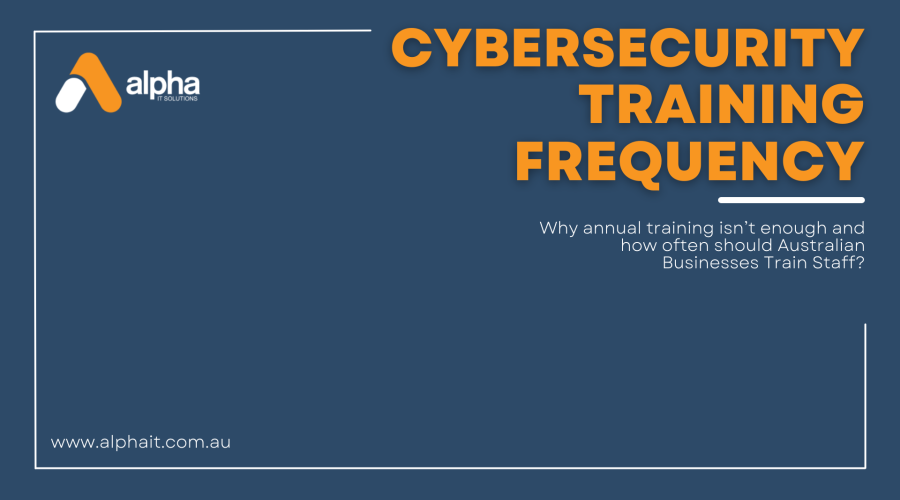
Why Every 4 Months is the Sweet Spot for Security Training
Published on August 19, 2025
Picture this: you’ve just finished your annual security training session. Your team learned how to spot dodgy emails, and everyone feels more confident about online safety. Fast forward six months, and someone accidentally clicks on a suspicious link, leading to a security incident that could have been avoided.
Sound familiar? You’re not alone. Many Australian businesses face this same challenge.
Why Annual Security Training Isn’t Enough
Here’s what we’ve learned from working with businesses: one awareness training session per year simply isn’t enough. People naturally forget what they’ve learned over time, especially when they’re not using that knowledge daily.
Think of it like learning to drive – you wouldn’t expect someone to remember everything after just one lesson, would you? Security training works the same way.
The Research: Every 4 Months is Optimal
Recent research from cybersecurity experts suggests that training every four months hits the perfect balance. Here’s what the study found:
- After 4 months: employees were still great at spotting suspicious emails
- After 6 months: their ability to identify threats started declining
- After 12 months: awareness performance had dropped significantly
The researchers tested this with groups receiving training at different intervals (4, 6, 8, 10, and 12 months), and the four-month frequency consistently delivered the best results.
Australian Privacy Laws and Training Requirements
Under Australia’s Privacy Act and the Notifiable Data Breaches scheme, businesses need to take reasonable steps to protect customer information. Regular security training demonstrates your commitment to data protection and helps you meet these compliance obligations.
Plus, the Australian Cyber Security Centre (ACSC) emphasises that people are often the first line of defence against cyber threats. When your team knows what risks to look for, they become your strongest asset in keeping your business secure.
Effective Training Methods That Actually Work
The good news? Effective awareness training doesn’t mean lengthy, boring sessions that take your team away from their work. Here are some practical approaches that work well:
Mix Up Your Training Methods:
- Short monthly videos sent via email
- Quick team discussions during regular meetings
- Weekly security tips in your company newsletter or team chat
- Interactive workshops with security professionals
- Practice exercises (like simulated phishing tests)
- Visual reminders around the office
- Celebrating Cybersecurity Awareness Month each October
Essential Topics to Cover
While suspicious emails are important, there’s more to security awareness:
Email Security and Phishing Awareness
Help your team recognise dodgy emails, text messages, and social media messages. Scammers are getting creative, so it’s worth covering all the ways they might try to trick people.
Password Protection
With most business tools now online, keeping login details secure is crucial. This includes using strong, unique passwords and understanding how password managers can help protect your business.
Mobile Device Security
Most of us use our phones and tablets for work these days. Simple steps like using screen locks and keeping apps updated make a real difference in protecting your data.
Data Handling
Everyone who handles customer information should understand how to store, share, and dispose of data safely. This protects both your customers and your business from privacy breaches under Australian law.
Building a Security-Conscious Culture
The goal isn’t just to tick a training box – it’s to create an environment where everyone feels comfortable asking questions about security and knows they’re supported in making the right decisions.
When your team feels confident about online safety, they’re more likely to speak up if something seems suspicious, rather than hoping for the best and clicking anyway.
Getting Started
If you’re currently doing annual training, consider breaking it into smaller, more frequent sessions. Your team will retain more information, and you’ll build stronger security habits across your organisation.
Remember, cybersecurity isn’t about perfection – it’s about building good habits and creating an environment where everyone feels equipped to make smart decisions online.
Ready to develop a training program that actually works for your team? We’d love to help you create an approach that fits your business and keeps your people engaged. Let’s chat about strengthening your security culture without overwhelming anyone.







 Lincon Mclaren
Lincon Mclaren Fernando Arriola
Fernando Arriola Narelle S
Narelle S Rick Fitzpatrick
Rick Fitzpatrick